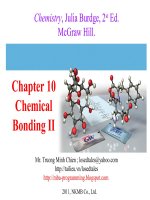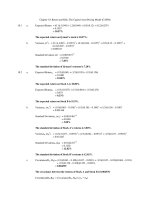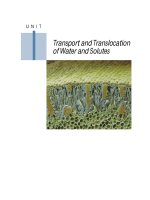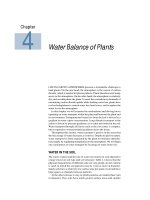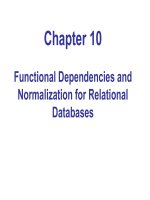Chapter 10 water soluble vitamins
Bạn đang xem bản rút gọn của tài liệu. Xem và tải ngay bản đầy đủ của tài liệu tại đây (2.16 MB, 98 trang )
Vitamins
Definitions
•
Apo-enzyme: protein portion of an enzyme system
•
Co-enzyme: Vitamin portion of an enzyme system
Co-Enzyme Action
Definitions
•
Precursor or Provitamins: can be converted to the active form of the vitamin in the
•
Antivitamin: vitamin antagonist, blocks the active site
body
Vitamins Characteristics
•
Organic components of food, but distinct from carbohydrates, fat, and protein
•
They are present in foods in small amounts
Vitamins Characteristics
•
They are required by tissues
– Health,
– growth,
– maintenance and,
– regulating body processes
– in very small amounts
Vitamins Characteristics
•
When lacking in tissues, they result in a specific disease or syndrome (combination
of symptoms and signs).
Vitamins Characteristics
•
Not synthesized in tissues in sufficient quantities to meet the body's needs
•
Non energy yielding nutrients
Vitamin Classification
•
Water Soluble
•
Fat Soluble
Water soluble vitamins
•
•
•
•
Soluble in ...
Minimal storage of dietary excess
Excreted by urine
Deficiency symptoms often develop rapidly
Water soluble vitamins
•
•
•
Must be supplied in diet every day
Stability varies
Generally do not have precursors
Primary deficiency caused by inadequate diet
Or
Secondary deficiency caused by problem inside the body
↓
Declining nutrient stores
↓
Abnormal functions inside the body
↓
Physical(outward) signs and symptoms
General Functions of
Water Soluble Vitamins
•
Energy Release
•
Metabolism of AA
•
Cell Replication: DNA - RNA synthesis
Energy Release
•
•
•
•
•
Thiamin
Riboflavin
Niacin
Biotin
Pantothenic acid
Metabolism of AA
•
Piridoxine (B6)
•
Pyridoxal
•
Pyridoxamine
Cell Replication
•
Folate
•
B12
•
All these vitamins function as a Co-Enzymes in chemical reactions, so...
•
They can be called regulators of body processes
Vitamin C
•
Does not function as a Co-Enzyme but is water soluble
•
Antioxidant
•
Collagen synthesis
Enrichment vs. Fortification
•
Enrichment: process of restoring
nutrients that were lost during
refining processes to levels present
in the original whole grain
•
Fortification
process of adding
nutrients to a product that may have
never been present or are added in
amounts greater than what should
be found
Husk, bran and
germ are
all lost in refining
B Vitamins
Thiamin
•
•
•
Soluble in water
Stability: Destroyed by heat
Absorption
– absorbed in small intestine
– carried by portal circulation
Thiamin
•
Excretion
– Excess excreted in urine, mainly
as thiamin
– decreased thiamin excretion with a
thiamin-load test may be indicative
of deficiency
Food Sources of
Thiamin
•
Sources
– Pork,
– Legumes,
– Nuts,
– Whole, fortified and enriched
grains
p. 329
